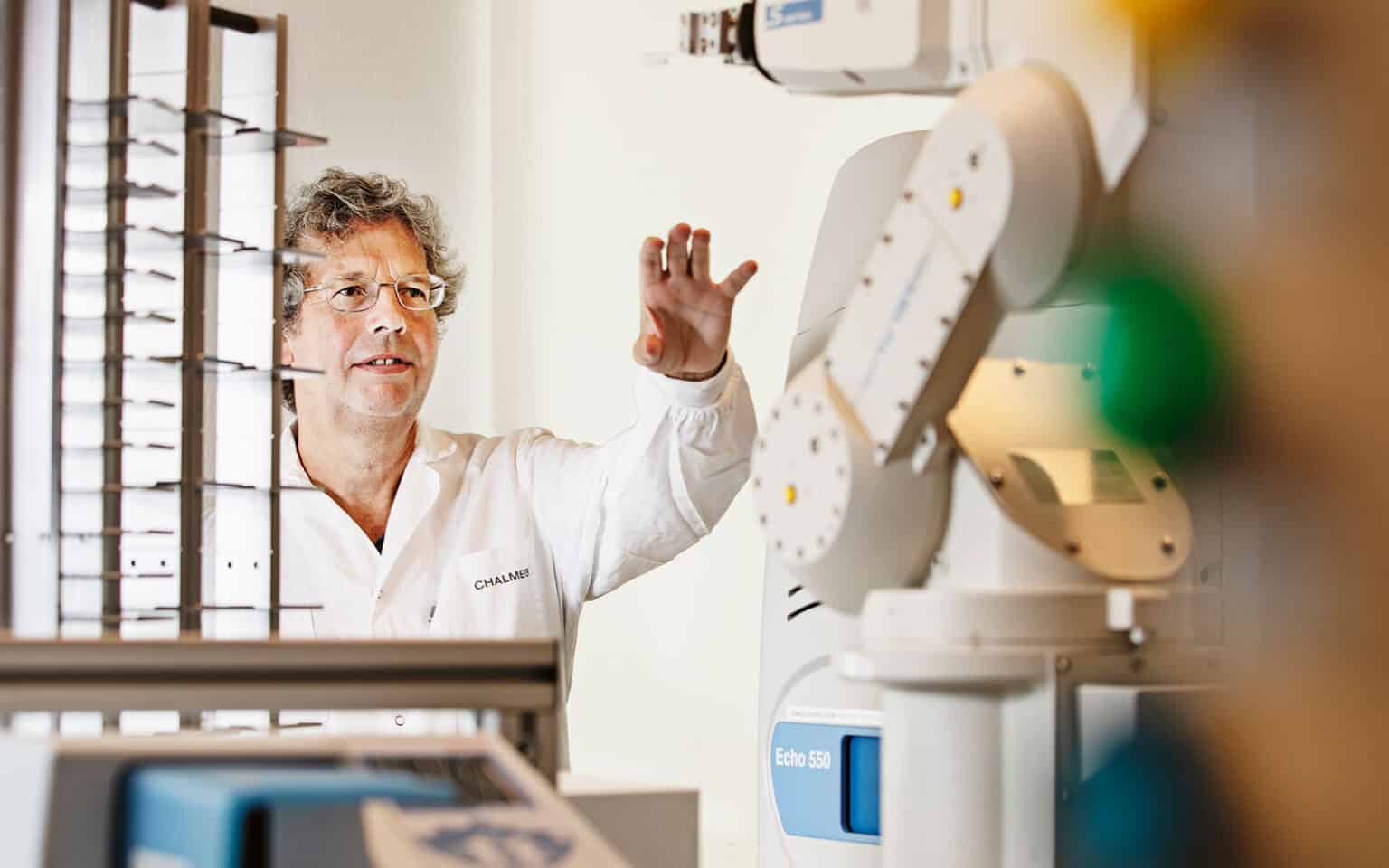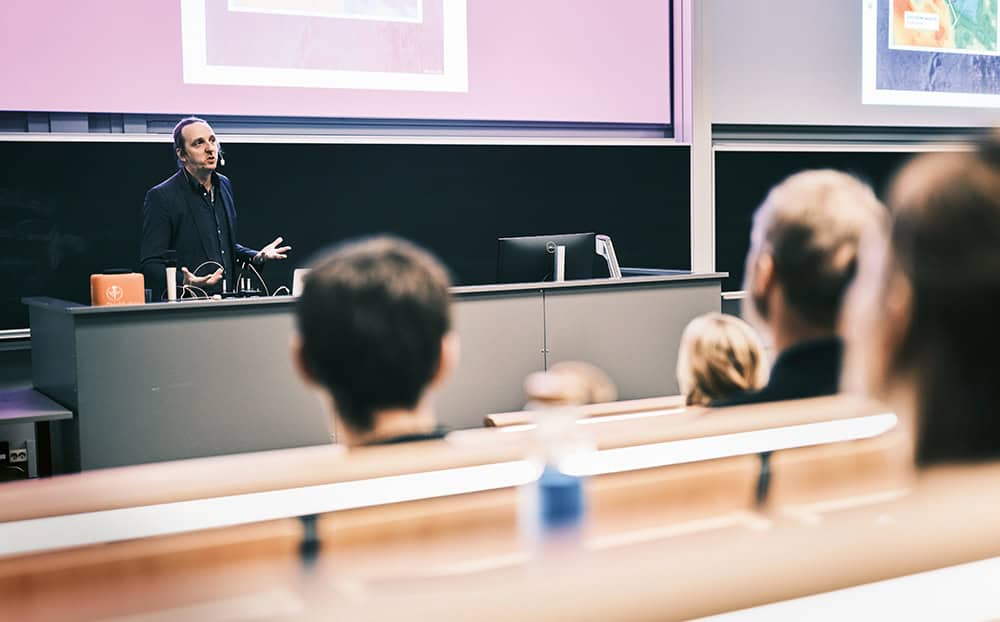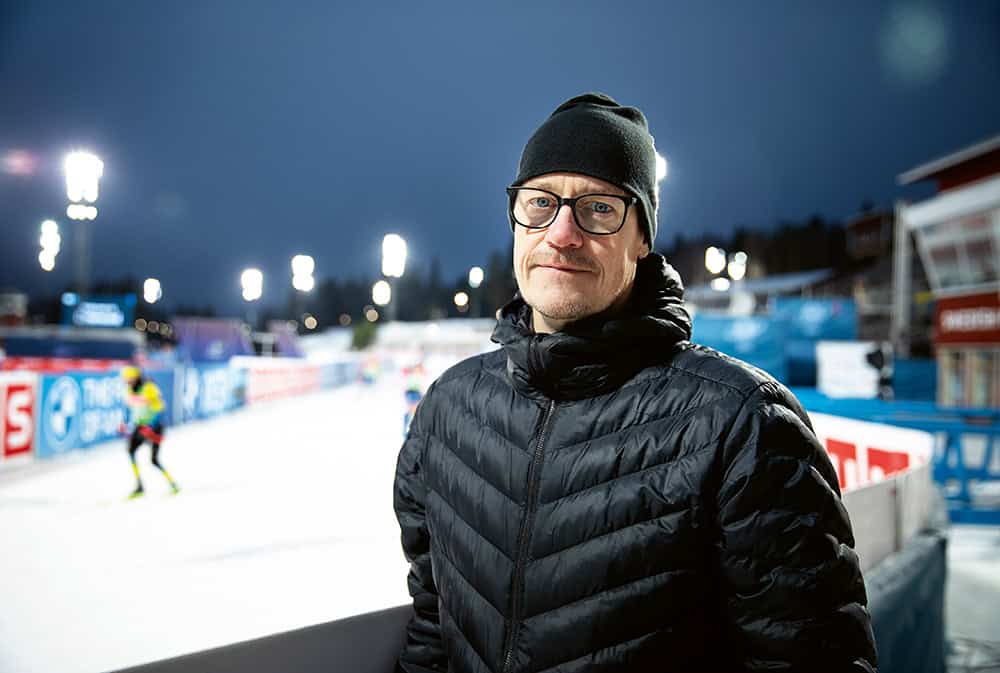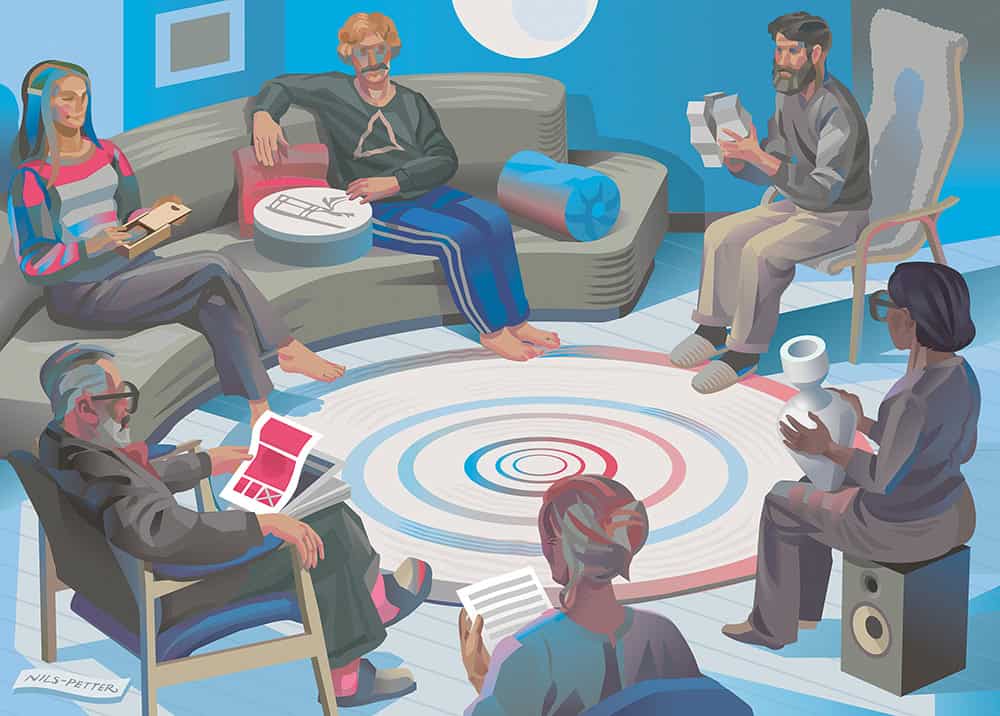Eve is currently still. When the robot is doing research, its white arms move quickly, connecting different systems, pouring liquids and moving samples. Eve is an automated laboratory system that uses artificial intelligence. It develops its own hypotheses, creates and conducts experiments to test them, analyses the results and then repeats the experiments to verify that the results are correct.
Eve is looking for chemical compounds that can be used in medicines against neglected tropical diseases that affect poor people in rural areas of Africa, Asia and Latin America.
“It has discovered that the substance triclosan is effective against the parasite plasmodium falciparum, which causes a form of malaria that kills hundreds of thousands of children under the age of five in Africa,” says Ross King, professor of machine intelligence at Chalmers University of Technology, who developed the research robot. “Eve has also found a molecule that could be used in covid-19 medicines.”
He shows us around Kemihuset, the building where his research group, King Lab, is based, and tells us that Eve can process significantly more information than a human or a machine without AI. It goes through thousands of chemical compounds quickly and systematically in its search for a molecule that could kill parasites or the covid-19 virus.
“Eve learns to see patterns quickly and connects the shape of the molecules with how well they work against a certain disease. It thus becomes better at choosing which substances to test and does not have to go through the entire library of substances.”
Ross King guides us through Kemihuset’s winding corridors and many security doors up to his office. He tells us that he developed the research robot to make science more efficient. The modern scientific method has fundamentally changed people’s lives since it was invented in the 17th century. Billions of people have a better standard of living today than royalty did back then.
“It is fantastic, but I feel that politicians and people in general do not fully appreciate it. They seem to think things have always been like this. But we still face many challenges, such as the climate crisis, pandemics, one in three people getting cancer and many people still living in extreme poverty.
If all the countries of the world joined together and shared resources, King says, we might be able to deal with the problems using today’s knowledge and technology. But he sees no signs of that happening. Not least because people in rich countries would have to lower their own standard of living.
“The only hope I can see is that science will become more efficient with the help of AI,” he says.
Originally, Ross King studied microbiology in his native Scotland. By chance, he became interested in computer science and machine learning, where computers learn to solve tasks by themselves.
The world’s interest in artificial intelligence has fluctuated over the years, he says. When King wrote his doctoral thesis on predicting protein structures with the aid of machine learning in the mid-1980s, the field was recovering from its most recent AI winter.
Ross King
… is 62 years old and a professor of machine intelligence at Chalmers University of Technology in Gothenburg. He is employed 80 per cent of his time by Chalmers and 20 per cent by Cambridge University. He lives in Mölndal, south of Gothenburg, and enjoys walking along the beautiful coast and in the nearby forest. In 1996, he collaborated with the musician Colin Angus of the Scottish psychedelic band The Shamen to develop the software program Protein Music, which translates DNA sequences into music. The result was the track S2 Translation and a scientific article.
In the 1960s, the British state research council had invested heavily in AI research, but in the early 1970s it began to wonder whether it was a good idea.
“They appointed a prominent mathematician from Cambridge University, James Lighthill, to look into whether there was any future for AI. He concluded that there was not. His report led to a decade-long slowdown in AI research worldwide.”
Ross King took a number of postdoc positions, but he found it difficult to get a permanent job. ‘Why have you done so much in biology and chemistry?’ computer scientists wondered; ‘You are not one of us’ biologists said. In the end, he took a job at Aberystwyth University in Wales.
Soon after that, research into human genetics started to take off, and suddenly it wasn’t such a bad thing to know about both computers and biology. He quickly became a professor, and in the late 1990s he began building his first research robot, Adam, which studied the metabolism of baker’s yeast. Yeast cells basically work in the same way as human cells, so can be used to understand those as well.
Adam presented hypotheses and conducted experiments that confirmed the functions of several genes – and became world famous as the first research robot to make a scientific discovery on its own.
“We were delighted. It felt like we had done world-changing research. It was the biggest research news for a day and I got my 15 minutes of fame. Then I couldn’t get any more funding, because there was a financial crisis.”
After five years, he finally received research funding and was able to finish building the next generation research robot, Eve. King is proud of the robot’s discovery that the substance triclosan can kill malaria parasites, he but is frustrated about how difficult it has been to develop actual drugs.
“We researchers do not have the resources required, and for the pharmaceutical companies it is not worth developing treatments because people in Africa are too poor to pay for them.”
Today, there are around a hundred research robots around the world. They are used in academia, government laboratories and by private companies, for example to find new medicines and materials for batteries and solar panels. Lists are published regularly about which jobs are threatened by AI, but Ross King does not think that university teachers and researchers have anything to worry about – yet.
Currently, machines and people work better together than independently of each other, he believes.
“The future of science is dependent on robots helping human researchers come up with and test new hypotheses and experiments. But in the longer term, I think AI scientists will be better than humans at science.”
AI could also make teaching more efficient, he believes. Students could have their own personal AI tutors, adapted to an individual’s level of knowledge and pace of learning.
“We know that one-to-one teaching is better for learning than lectures in large groups. The human teachers could step in when the AI system fails to teach something to a student.”
Nor is it the job of science to provide researchers and teachers with work, he adds. “ This is not why the government invests money in higher education. Scientists and teachers do not have the right to be paid forever if they are not productive compared with machines.”
Ross King is one of the founders of The Nobel Turing Challenge, where the aim is to develop AI researchers who can produce Nobel Prize-level research by the year 2050.
Will you achieve that?
“I think so. The likelihood has increased quite a lot recently, thanks to AI developments in language models such as Chat GPT.
Could an AI win the Nobel Prize?
“No. Alfred Nobel made it quite clear in his will that the prize should go to a human being.”
But not everyone likes these developments. There are examples of researchers in robotics who have been subjected to threats and violence because of their work.
“Some people are worried about AI and want to stop its development. People have told me that I have done a terrible thing by creating research robots. That they could endanger the planet, for example by making it easier to produce biological weapons.”
How do you answer them?
“I tell them that research is a double-edged sword. Science and technology are generally of benefit to humanity, but the same technology can be used for good or evil. I believe we have an obligation to try to stop climate change and to help poor people.”
King is not one of those who are afraid that AI will develop into an evil being with its own will and agenda. However, he is worried about the technology falling into the wrong hands and being used to develop biological weapons, for example.
Next time we speak is by video link. Ross King is at the house in Wales that he has owned since the time he was working at Aberystwyth University. He turns his computer toward the window.
“It is so beautiful here. It’s foggy today, otherwise you’d see the sea and the mountains over there.”
In 2019, King was contacted by the Wallenberg AI, autonomous systems and software programme, Wasp, and received funding to build the next generation research robot, Genesis. So he and Eve moved from the University of Manchester to Chalmers. But right now things look bleak for Eve.
In the spring of 2023, King and some members of his team moved from the Department of Life Sciences to the Department of Computer Science. The research team and the institutions signed an agreement about the move which gave the team right to use the offices and labs at Life Sciences on the same terms as other research groups at Chalmers.
In October of the same year, he was informed that the entire Kemihuset building was to be renovated and that his lab would be demolished to make room for undergraduate education. He was devastated. Eve could be in use for another five to ten years, but is too old and fragile to be moved, he explains.
The renovation, due to begin in 2025, means the end of the research robot and the studies of neglected tropical diseases and covid-19.
“I am very disappointed. I have spent years building the robots and Eve, along with Adam, is the most famous one I have made.”
Ross King does not think that his lab needs renovating.
“It is incomprehensible to me that expensive labs are being converted into premises for undergraduate education. I have not received any reasonable explanation for the decision. At home in the UK, universities respect signed agreements and do not waste taxpayers’ money.”
Fredrik Nilsson, deputy vice-chancellor for campus and sustainable development at Chalmers, says that Kemihuset is old and needs to be completely renovated. All activities at Campus Lindholmen are being moved to Campus Johanneberg, where the Kemihuset building is located, and space is needed for more students.
A preliminary study for the project was launched in 2019, and in 2023, a programme was carried out in which the affected departments were involved. Ross King’s team only came on board at the end of this work, after the steering group realised that it had not been involved to a sufficient extent.
“Many research teams will need to move their lab operations,” says Nilsson.
However, a new lab will be built for the next generation research robot, Genesis. It is being built in the USA and is expected to be finished within 1½ years. Ross King tells us that Genesis, just like Adam, will research yeast cells, but on a much larger scale.
“Thousands of chemical reactions take place in a living cell, and trying to understand how it all works is complicated,” says King. “It is also difficult, both from an AI and from an engineering perspective, to design the experiments. The development of Genesis has taken five years, and we are excited that we will soon be able start using it.”
Biblical names
Ross King’s first research robot was named partly after Adam of the Bible, who some regard as the first scientist, and partly after the Scottish economist Adam Smith, who is usually called the father of modern economics and was interested in how factories could be made more efficient. Eve is a more elegant, better-designed robot. His third research robot is named Genesis, which means ”origin” in Greek and is also the name of the first book of the Old Testament of the Bible, which contains the creation story.



















